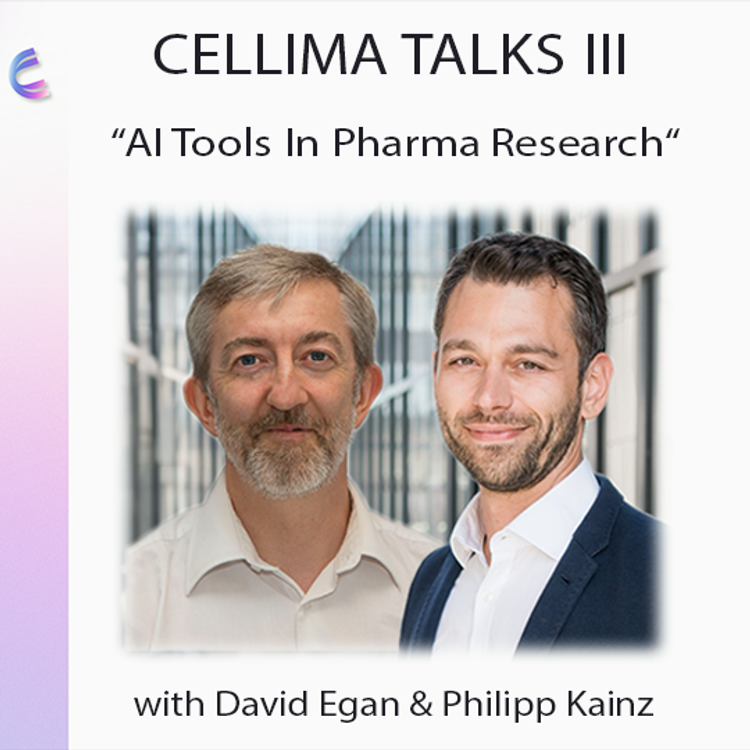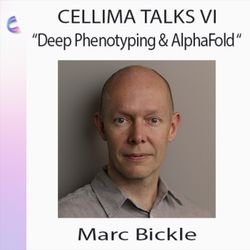Share

CELLIMA TALKS
AI Tools In Pharmaceutical Research
🔬 On November 14th
I had an exciting discussion on the use of specialized "AI tools in early drug discovery" with David Egan, CEO of Core Life Analytics, and Philipp Kainz, CEO of KML Vision.
We discussed the use of the latest developments in advanced machine learning and deep learning research that have the potential to significantly enhance research efforts in early drug discovery. In addition to all the opportunities and benefits that these modern AI tools bring, we will also and most importantly address the inflated expectations, exaggerated fears, and drawbacks that this modern approach also brings.
🧠 Learn how to get the most out of your data with the safe use of AI tools.
📺 This was a live streaming event. The recording of the talk is now also available as this podcast.
Enjoy the show, Stefan
More episodes
View all episodes

6. Deep Phenotyping & AlphaFold
40:15||Season 1, Ep. 6In this webinar, Dr. Marc Bickle will introduce the pioneering use of Deep Phenotyping and AlphaFold, two cutting-edge technologies that are reshaping early-stage drug discovery. Deep Phenotyping, supported by high-content imaging, enables the extraction of detailed, multiparametric data from complex 3D cellular models, offering valuable insights into disease mechanisms, particularly in the areas of oncology and neurodegenerative disorders.Through the integration of AlphaFold’s AI-driven protein structure predictions, researchers can model biological processes with a new level of precision, enabling the identification of novel therapeutic targets. Participants will gain a clear understanding of the latest advancements, practical applications, and the ways these technologies are accelerating the development of personalized therapies.Key Takeaways:Recent advancements in Deep Phenotyping and AlphaFoldOvercoming challenges in data analysis and interpretationApplications in oncology and neurodegenerative researchFuture prospects for AI in precision drug discoveryAbout the Speaker: Dr. Marc BickleMarc led the phenotyping platform at the Institute of Human Biology (IHB) in Basel. Previously, he headed the Technology Development Studio at the Max Planck Institute for Molecular Cell Biology and Genetics in Dresden. After earning his PhD at the Biozentrum in Basel, where he studied the immunosuppressive drug Rapamycin, Marc conducted research at the Laboratory of Molecular Biology (LMB) in Cambridge, focusing on the genetics of C. elegans behavior. As co-founder of the biotech company Aptanomics in Lyon, he has contributed significantly to drug discovery efforts.Marc’s current work focuses on the development and implementation of deep phenotyping screens using advanced 3D cell models. His team uses highly automated systems to identify molecular signatures and collaborates with Roche and IHB scientists to advance novel technologies such as spatial omics.CELLIMA 2024
5. Wächter der Gesundheit
41:19||Season 1, Ep. 5Willkommen zum Exklusivinterview mit Thomas Müller, einem renommierten Wissenschaftler mit mehr als 30 Jahren Erfahrung in der Ionenkanalforschung.Thomas Müller spricht über seine Anfänge als Student in Heidelberg und Glasgow bis hin zu seiner heutigen Position als Leiter des Cellular High Throughput Screening bei Bayer. Dort trifft er wichtige Entscheidungen über die neuesten wissenschaftlichen Entwicklungen und Forschungsprojekte.Thomas nimmt uns mit auf eine faszinierende Reise in die Welt der Ionenkanäle und gibt uns neue und spannende Einblicke, wie diese winzigen Strukturen eine entscheidende Rolle in unserem täglichen Leben spielen.Thomas stellt uns auch einige spannende Technologien vor, die uns helfen, die Funktionsweise von Ionenkanälen besser zu verstehen. Dazu gehören die Elektrophysiologie und die Optogenetik.Ob Sie ein erfahrener Forscher, ein Biologiestudent oder einfach nur neugierig auf die neuesten Fortschritte in Wissenschaft und Medizin sind, wir laden Sie ein, sich von den kreativen und spannenden Neuigkeiten in der medizinischen Forschung inspirieren zu lassen.Das Interview wurde in deutscher Sprache aufgezeichnet.Wir bieten auch eine englisch synchronisierte Version an.(c) CELLIMA 2024
5. GUARDIANS OF HEALTH
41:18||Season 1, Ep. 5Welcome to an exclusive interview with Thomas Müller, a renowned scientist with more than 30 years of experience in ion channel research.Thomas Müller talks about his beginnings as a student in Heidelberg and Glasgow to his current position as Head of Cellular High Throughput Screening at Bayer. There he makes important decisions about the latest scientific developments and research projects. Thomas takes us on a fascinating journey into the world of ion channels, giving us new and exciting insights into how these tiny structures play a crucial role in our everyday lives. Thomas also introduces us to some exciting technologies that have helped us better understand how ion channels work. These include electrophysiology and optogenetics.Whether you are an experienced researcher, a biology student, or just curious about the latest advances in science and medicine, we invite you to be inspired by the creative and exciting news in medical research.The interview was recorded in German. Your are listening to the dubbed English version.We offer the original German version as well.(c) CELLIMA 2024
4. The Power of Cell-Painting and AI in Pharmaceutical Innovation
24:40||Season 1, Ep. 4In this session, Stefan Prechtl joins Niranj Chandrasekaran from the BROAD Institute to discuss the innovative convergence of cell biology and artificial intelligence in drug discovery. Learn more about how cell biology and AI technologies are transforming the research field and changing our approach to drug discovery.The webinar was recorded on Friday, January 12, 2024 and offers unique insights from a leading expert in the field. Whether you are a researcher, student, or simply curious about the latest developments in pharmaceutical research, this is your opportunity to gain valuable knowledge.Listen to the full conversation and follow along with the insightful discussion.We appreciate your interest in this topic and hope you enjoy the insights from this interview!
1. Machine learning for improved image analysis in research and development
01:00:31||Season 1, Ep. 1In this interview, Philip Kainz, CEO of KML Vision, talks about the development of analysis tools for scientific research. https://www.kmlvision.com/about-us/#teamHe describes how machine learning algorithms efficiently support scientists in pattern recognition. He shares his journey from computer scientist to co-founder of KML Vision, a company dedicated to bringing ML solutions to those without the technical knowledge or resources. He talks about the differences between working with academics and the pharmaceutical industry. Finally, he explains the advantages of KI technology over traditional image analysis methods. How these new, future-oriented tools can be successfully used for both prospective and retrospective data analysis.You can also watch the interview on Youtube:https://www.youtube.com/live/1BjC-wffe4Q?si=R-JRVe5oalj2orFT#machinelearning #research #academia #industry #artificialintelligence #cellima #imageanalysis #algortihmshttps://www.cellima.com
2. Drug Discovery in Early Research
40:40||Season 1, Ep. 2CELLIMA TALKS II: Eugenio Fava talks about "Drug Discovery in Early Research".Eugenio Fava is an enthusiastic and experienced scientist with a deep knowledge of neuroscience and drug discovery. In the CELLIMA TALKS series, Eugenio will bring drug discovery closer to us. https://www.dzne.de/forschung/core-facilities/Strategic drug discovery requires a fundamental understanding of the disease in order to identify critical targets and develop efficient chemical entities using novel technologies. Among other topics, we will discuss the role of academic institutions in drug discovery versus pharmaceutical companies. We will talk about the current challenges researchers face when looking at the entire process. We will also discuss current hot topics such as the importance of using artificial intelligence in drug discovery, the use of 3D cell models, stem cell technologies or single cell applications in drug screening. I look forward to the discussion with Eugenio Fava and invite you to join us.Here is a link to the recorded video of the webinar on YouTube:https://youtu.be/ewXYr8EodmY?si=Ci-5Gt8c60NlUBUw#cellima #highcontentimaging #drugdiscovery #research #ai #deepl #machinelearning #organ-on-a-chip #3dcell